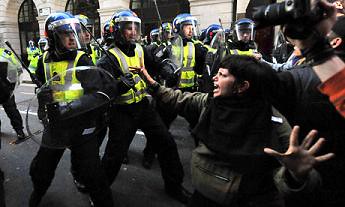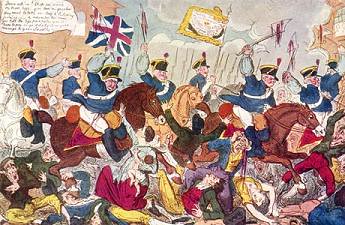On PASystem, SamF reminds us that the Sunday after next is the 190th anniversary of the Peterloo Massacre, when a crowd of peaceful demonstrators demanding democracy was charged by cavalry. Back then, any demand for reform of the UK's undemocratic system of government was regarded as by definition seditious and treasonous, and any public gathering in favour of such "radical" ideas a revolution in the making, which had to be nipped in the bud by armed force. Reading the continuing fallout from the London G20 protests, where peaceful protestors were "kettled", then beaten for failing to disperse (at the cost of one life), I'm left with the overwhelming impression that that attitude has never really gone away. Sure, the weapons have changed - but the basic response is still the same:

(Image stolen from the Guardian)
This time, even the authorities seem to realise they've gone too far. The chief inspector of constabulary has recommended a complete overhaul of the policing of protests, starting from the position that police are there to facilitate peaceful protest rather than suppress it (he also recommended that police actually obey the law and wear their badge numbers at all times so they could be held accountable for any abuse of their power - something honoured mostly in the breach, it seems). This has now been backed up by the first report from the UK's Independent Police Complaints Commission (into a woman who had been severely beaten and crushed by a police shield-wall), which has likewise recommended a complete review, better communication with protest groups, and proper plans to let distressed or vulnerable people out of "kettles". And they haven't even got to the serious cases yet. The question though is whether the police will listen to these recommendations or simply ignore them. Unfortunately with a culture and leadership which regards the public as the enemy and protest as fundamentally illegitimate, I expect the latter.
